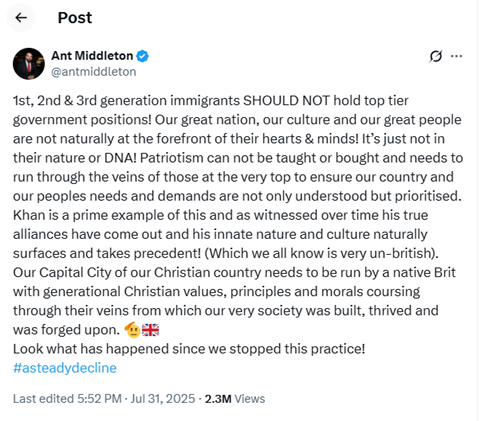In announcing he will stand for Mayor of London, the former-SAS soldier, Ant Middleton said Britain’s capital deserves a “native” leader with “generational Christian values coursing through their veins”. Co-opting Christianity for political gain is dangerous, says Symon Hill, and the Church should play no part in supporting it

As followers of Jesus, we are taught to be “wise as serpents and innocent as doves” (Matthew 10:16).
I am alarmed therefore by how many Christians are cheering politicians who promise to protect “Christian values”. We should not be so naïve as to welcome such comments without asking what is meant by them.
Celebrity and ex-SAS soldier Ant Middleton recently posted on X: “Our Capital City of our Christian country needs to be run by a native Brit with generational Christian values, principles and morals coursing through their veins”.

But what does he mean by “generational Christian values”? Following Jesus is not hereditary. It is a personal choice, albeit with major implications for society. Middleton also argued that only people born in the UK, and whose parents and grandparents were born in the UK, should hold “top tier government positions”. He may have overlooked the fact that this would rule out several former prime ministers, including Winston Churchill.
To attack a political opponent on grounds of ethnicity is to undermine the Christian values that Middleton claims to defend
Middleton made the above remarks amid an announcement that he planned to stand in the 2028 London mayoral elections. He was initially tipped to be the Reform UK candidate, but recently announced that he would stand as an independent to defend “British culture”. In his post, Middleton took aim at current Mayor of London, Sadiq Khan. Whatever we might think about Khan’s policies, the birthplace of his parents should be irrelevant.
Breaking down the divide
I cannot see into Middleton’s heart or question the sincerity of his faith. Only God sees into his heart, just as only God sees into my heart or yours. I can, however, say that his comments seem utterly incompatible with Jesus’ teachings.
Jesus broke down hostility between Jews and Samaritans, and Jews and Gentiles. The New Testament is full of challenges to ethnic and social divisions so that “there is no Gentile or Jew, circumcised or uncircumcised, barbarian, Scythian, slave or free, but Christ is all, and is in all” (Colossians 3:11). To attack a political opponent on grounds of ethnicity is to undermine the Christian values that Middleton claims to want to defend.
We should note that many who use the rhetoric of “Christian values” also talk of defending “British values”. Many also tend to be strongly nationalistic and anti-migrant. In the 2015 UKIP manifesto, Nigel Farage MP, now leader of Reform UK, said Britain needed “a much more muscular defence of our Christian heritage and our Christian Constitution”.
Independent MP Rupert Lowe recently launced a new political movement, Restore Britain. On X, he said it’s aim was to “slash immigration, protect British culture, restore Christian principles, carpet-bomb the cancer of wokery”.
Yet both men consistently use demeaning language when speaking about migrants and refugees and rely on highly questionable statistics. Farage recently claimed that Afghan men in the UK are 22 times more likely to be convicted of rape than British-born men. He did not, and could not, cite the slightest shred of evidence for this claim, which was later disproved by critical journalists. Despite this, it was repeated without evidence by his supporters on social media.
I do not expect all Christians to agree on all aspects of migration policy - or any other issue. Christian values cannot, however, be squared with demonising particular people groups, dismissing the needs of refugees or showing less concern for people of one nationality than those of another.
Scripture is full of commands such as: “The foreigner residing among you must be treated as your native-born. Love them as yourself, for you were foreigners in Egypt. I am the Lord your God” (Leviticus 19:34).
A Christian Britain?
Nationalistic and anti-migrant parties mistake Christianity for Britishness – and for their very narrow notion of Britishness at that. If you visit parts of social media inhabited by these groups, you will find simplistic equations between being British, being white and being Christian. The reality that a large percentage of British Christians are not white seems to pass them by.
The central role of Christianity in British history is difficult to overstate. While Jesus’ teachings have at times inspired people with power in Britain, they have on many more occasions inspired people to resist the powerful.
Following Jesus is not hereditary. It is a personal choice
Jesus’ teachings inspired anti-slavery activists. In the 17th century, they inspired people to stand up for religious liberty against the monarchy, leading to the emergence of Baptists, Congregationalists, Quakers and other Christian movements we still recognise today.
Christian faith has been central to peace workers and war resisters in Britain and around the world, including people working for justice and reconciliation in Northern Ireland.
The nationalistic and authoritarian attitudes of Middleton, Farage and Lowe have little in common with these people’s values. They are more comparable to the values of the rulers and powerful bodies who many of them campaigned against.
“Not everyone who says to me ‘Lord, Lord’ will enter the kingdom of heaven,” said Jesus (Matthew 7:21). The nationalistic politicians and candidates who want to preserve Britian’s “Christian values” seem less keen to pay attention to Jesus’ words.
I pray that God will give us courage to follow Jesus’ example of standing with the marginalised and pulling down barriers, rather than falling for the claims of those who misuse Christian language to attack people different to themselves.






































6 Readers' comments